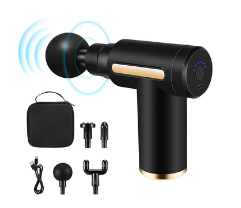Many considerations should be taken into account when you are choosing the right fascia gun for body use so that it will suit your needs well. Well, the first place to start is with power and speed settings. The routine operation range of these devices lies between 1,200-3,200 percussions per minute which is crucial for deep massage to the muscles to break down lactic acid and also get rid of muscle adhesions while restoring your body's blood circulation. The speed settings are adjustable, which means you can tailor the intensity of your massage to suit both how deep in layers one wants it and what exactly muscles group is being targeted. For example, if you have big muscles like the thighs or back a higher speed is suitable for use and indicate slower speeds on smaller areas such as neck.
The amplitude is also important as it determines the depth at which the gun head will move down into muscle tissue. Amplitudes vary from 10mm –16 mm. A fascia gun with an amplitude of 16mm or more will penetrate deeper into the muscle layer, but also provide better comfort for chronic pain and after exercise. Longer amplitude: if your goal is to really dig into those deep muscle knots and improve recovery time this feature is key.
Another important consideration when choosing the ideal fascia gun includes its weight and ergonomics. Units falling within the 1.5 to 3 pound range are light enough for convenience and heavy enough for a stable hold while giving proper pressure during work. An angled handle or slip-resistant grip may also be employed as some of the ergonomic design characteristics that could make using fabric shaver more convenient to use over-length pastes so hand fatigue is much less available. It is especially critical if you intend to employ the fascia gun regularly or extensively.

Another important factor is battery life, as many users may use the fascia gun when traveling. Fascia guns usually have a battery life of 2 to 5 hours per charge, and most high-level models support fast charging. On the other hand, if you are an on-the-go or a gym goer who uses their recovery tools at least 3 times per week then it would be in your best interest to purchase a device with longer battery and quick charge. This in turn keeps the gun always available for you to use, without needing frequent recharges.
When it comes to your choice fasica gun, cost efficiency is another aspect that you must take into account. The prices usually range from $100 to $400, depending on the brand and features. While pricier models may have extra features such as Bluetooth connectivity or app integration, a mid-range model is usually the best compromise for price and performance. In a 2022 Consumer Reports survey, proper balance between the money and gadget quality achieved 80% of positive ranking for fascia guns in $150–$250 range.
In recent years, the popularity of fascia guns has soared as professional athletes and fitness influencers have endorsed them. In the NBA, for example, fascia guns are becoming increasingly common with players like Steph Curry incorporating them into their daily recovery routines. Such widespread deployment into high-performance sports buildings further highlights the ability of these devices in appearing as useful measures for enhancing muscle recovery and lowering soreness.
“With a high-quality fascia gun, your body’s long-term health and quality of life are worth the investment,” says Dr. Jason Wersland, creator of Theragun in this sector-leading brand — who later released state-of-the-art massage guns besides their fascinating marketing clip on social media. The right tool could improve you recovery and well being by a lot. This statement just underlines the importance of getting proper fascia gun suitable for your individual recovery needs.
This will help you choose the right gun for your body based on power, amplitude, weight, battery life and price. To aid in your search for a muscle stimulation device to fit in with your busy life, consider these factors: Check out the body fascia gun for a range of choices to pick your perfect recovery therapist.